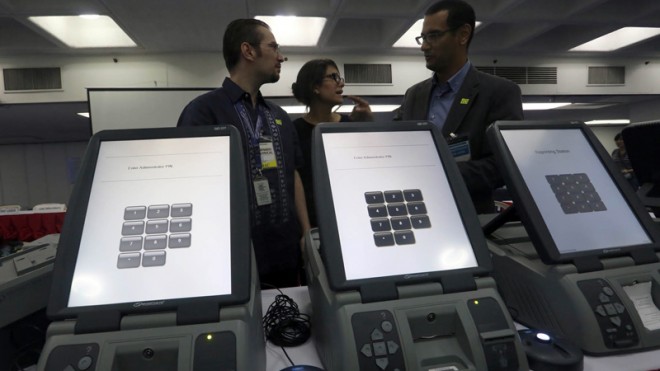
Smartmatic and the Commission on Elections may have concluded a contract to refurbish 82,000 voting counting machines that could cost up to P2 billion, but they still have a lot of explaining to do, according to Sen. Aquilino Pimentel III. INQUIRER PHOTO/JOAN BONDOC
MANILA, Philippines–“Manual is out of the question. There is barely enough time for another solution.”
Speaker Feliciano Belmonte Jr. issued this statement in an attempt to dispel speculation that there would be a return to manual elections in May 2016, just hours after the Supreme Court unanimously nullified a P268.8-million “midnight deal” the Commission on Elections (Comelec) had signed with Smartmatic-TIM (Total Information Management).
Election lawyer Romulo Macalintal warned that the ruling may also lead to the postponement of the 2016 elections (no elections or “No-El”).
Three days before his retirement in February, Comelec Chair Sixto Brillantes Jr. signed the contract to repair 82,000 voting machines for next year’s balloting despite widespread criticisms from various sectors.
The court said the Comelec had violated the procurement law when it decided to directly hire Smartmatic for the maintenance job in lieu of a public bidding, according to spokesperson Theodore Te.
Briefing reporters on the decision handed down in Baguio, where the court is holding its summer session, Te said, “The court ruled that the Comelec failed to justify its resort to direct contracting with Smartmatic-TIM.”
“Its claims of impracticality were not supported by independently verifiable data and its perceived ‘warranty extension’ is, in reality, a circumvention of the procurement law,” he said, quoting the key part of the decision.
Return public funds
“It is clear that the Comelec committed grave abuse of discretion and, thus, its Resolution No. 9922 and the Extended Warranty Program (Part 1) should be stricken down and, necessarily, all amounts paid to Smartmatic-TIM pursuant to said contract, if any, being public funds, should be returned to the government,” the court said.
The high tribunal said its order was “immediately executory in view of the time considerations.”
The Comelec had said that it resorted to the deal because of time constraints for the machines to be ready by May 2016. It also invoked direct contracting provisions under the law, which allowed the method when “goods procured are of proprietary nature” and could be obtained only from one source, and when “there is no substitute for the product.”
Comelec spokesman James Jimenez said the poll body had laid out several options in the event of an adverse decision but that it was premature to discuss them because the entire decision had not been released.
Deputy Speaker Giorgidi Aggabao warned that the court ruling could have an “adverse, unintended effect” of pushing back the elections to the “error-filled” manual counting.
Law disallows manual vote
“It is not too late for the Comelec to sort out the mess. Worries over the reliability of manual voting should fuel the Comelec to rebid the repairs as soon as possible. Comelec should not seek a reconsideration and move for a rebidding at once,” said Aggabao.
Rep. Edgar Erice, chair of the House committee on suffrage and electoral reforms, said that manual voting was not in the cards, pointing out that this was not allowed under the law.
“A return to manual would require an amendment to the automation law. I think the Comelec should comply with whatever requirements that voided the contract. A return to manual without legislation from Congress might be construed as judicial legislation,” said Erice.
Bayan Muna Rep. Neri Colmenares said the court decision should not affect preparations for the 2016 polls.
Colmenares said the ruling only meant that the Comelec should do the repair and diagnostics on its own, considering that it already owned PCOS (precinct count optical scan) machines.
“What the SC did was to stop a self-dealing deal where the one doing the diagnostic would itself do the repair,” said Colmenares.
He said a return to manual elections could be challenged in the Supreme Court.
IBP, AES petitions
Colmenares said Bayan Muna would file a bill to adopt a “verifiable, open transparent electronic system” where the counting at the precinct level would be manual and the canvassing would be automatic starting from the municipal level.
The Supreme Court made permanent the temporary restraining order (TRO) it had issued on March 24 against the contract.
The decision granted petitions separately filed by the Integrated Bar of the Philippines and Bishop Broderick Pabillo, along with copetitioner Automated Election System Watch. Both petitions cited lack of public bidding in the deal.
Time running out
Macalintal noted time constraints having to go through public bidding—precisely what the Comelec had cited in its defense of its contract.
“Since we practically have 12 months to go before the May 2016 elections, this gives Comelec barely three months to go full blast in its preparation. For sure, this is too short a time to conduct a presidential election which, as could be foreseen, would be hotly contested so with the election of the local elective officials,” the lawyer said in a press statement.
He said the bidding process alone would take up to seven months. As an example, he said two months more would be needed to replace or rehabilitate the voting machines, “if say 30 percent… are found defective or no longer useful.”
“Or worse, there might be a need to purchase additional PCOS machines if 30 percent of the PCOS are found defective. And this will involve additional time for the Comelec to conduct the bidding for these additional machines,” he said.
RELATED STORIES
SC scraps P269-M Comelec-Smartmatic warranty deal
Brillantes inks Smartmatic deal, retires